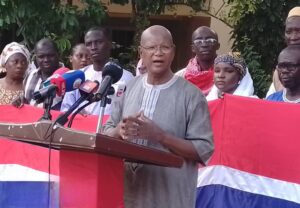Once again, it’s another March 8, and another International Women’s Day celebrations; but do Gambian women have much to celebrate under the regime of President Adama Barrow?
It’s quite a well known fact that many Gambian women, both at home and abroad, were among those in the forefront of the fight against the Yahya Jammeh dictatorship which eventually led to regime change in 2016. Many of them participated quite actively in the struggle against the dictatorship, and some of them did so at great personal risk to themselves and their families.
While the list of those women who participated in the struggle is definitely in-exhaustive, but we can cite a few examples like the two former Vice Presidents; Fatoumata Jallow Tambajang and Dr. Isatou Touray, both of whom played an active part in the struggle to end the Jammeh regime. There were also activists like Fatou Jagne-Senghore who was based in Dakar and played quite an active role in hosting and catering for victims of the Jammeh regime after they fled the country; Ndey Tapha Sosseh, who was based in Mali and who also helped and gave comfort to many victims of the Jammeh regime both inside and outside of the country.
Also in the diaspora, we had such activists like Ya Soffie Ceesay, Mama Linguere Sarr, Fatu Camara, Sigga Jagne, Binnet Bojang, Sohna Sallah, the late Tuku Jallow and so many others whose names I may not recall right now. They all joined several other activists to use different means to help bring about an end to the dictatorship.
However, despite the great role that the women played in getting rid of the Jammeh dictatorship, they have not been given the space that they had deserved in the new administration. We have seen that even the little space that was created for them at the beginning of the Barrow administration had been shrinking rather than expanding. For instance, the post of Vice President which was apparently reserved for the women since the Jammeh era, was unceremoniously taken away from them and given to the men. We also recall that instead of consolidating the two women regional governor positions that had been allocated to them at the beginning of the Barrow administration, there is now none in existence. It is a similar situation in many other public sector agencies where the women had been squeezed out. For instance, we have only three elected female members out of 53 members of the National Assembly and three ministers out of a cabinet of more than 20 members. This is an apparent indication of the administration’s lack of regard for gender mainstreaming.

Meanwhile, as the women are observing International Women’s Day, they are being threatened with a repeal of the law banning Female Genital Mutilation (FGM), which has been proven to be a health hazard to women and girls. One would have expected that both President Barrow and the other political leaders would have made public statements in opposition to the threat by some National Assembly members to repeal the law. At least that would have made a difference with their parties’ National Assembly members if they knew that their party leaders were not in support of the plan to repeal the law. However, both President Barrow and the other party leaders are keeping silent over the matter, apparently because they do not want to provoke the radical clerics like Imam Abdoulie Fatty and those National Assembly members playing to the gallery in a bid to satisfy the fundamentalists who continue to use their pulpits to not only threaten those against FGM, but they are also inciting people to disobey the law.
Therefore, if the government is not coming out to protect the women against these radical Islamists and those blindly following them, then one would wonder where they should turn to for protection.
The Gambia is gradually turning into one of the unfriendliest countries to be a woman.




